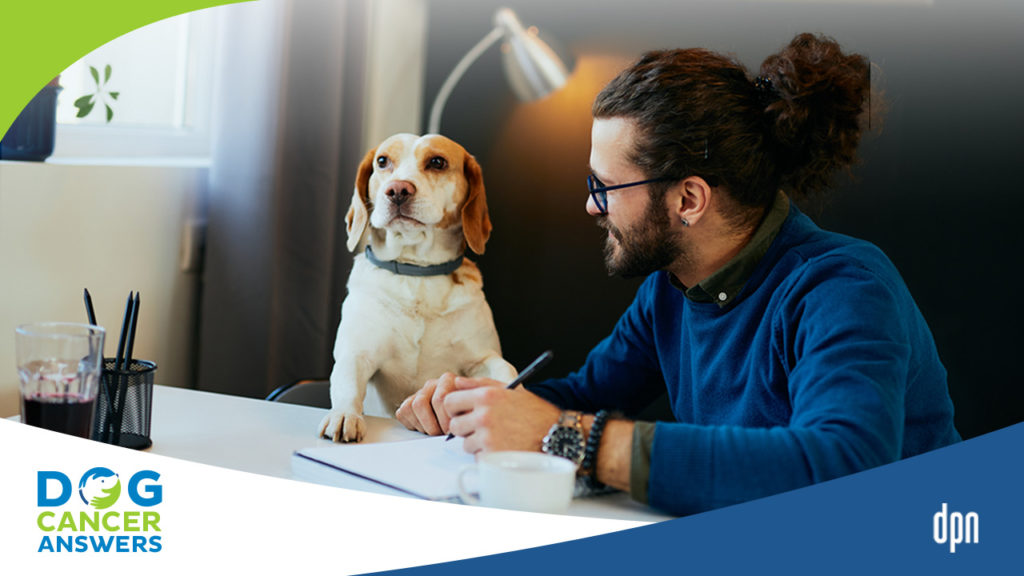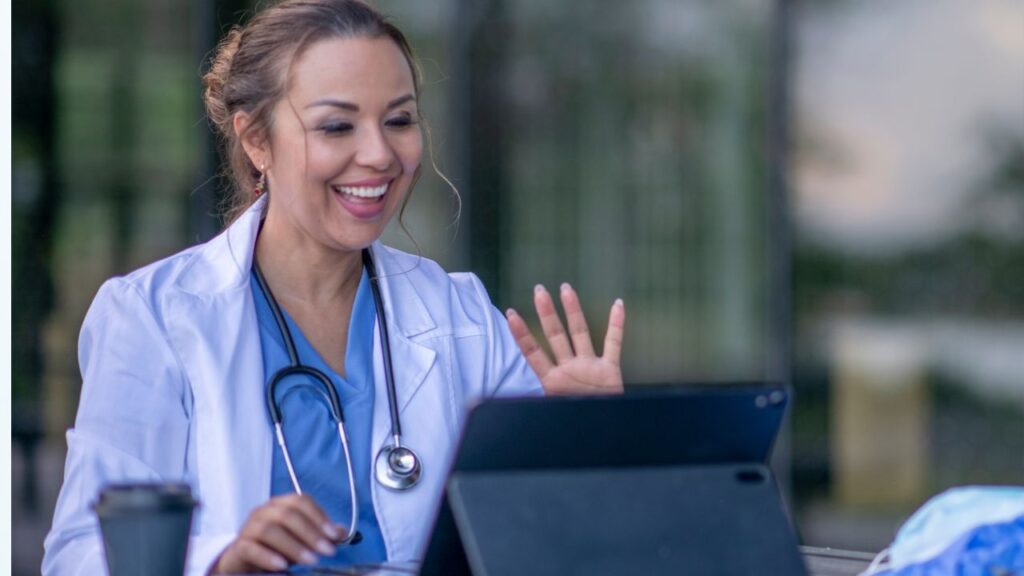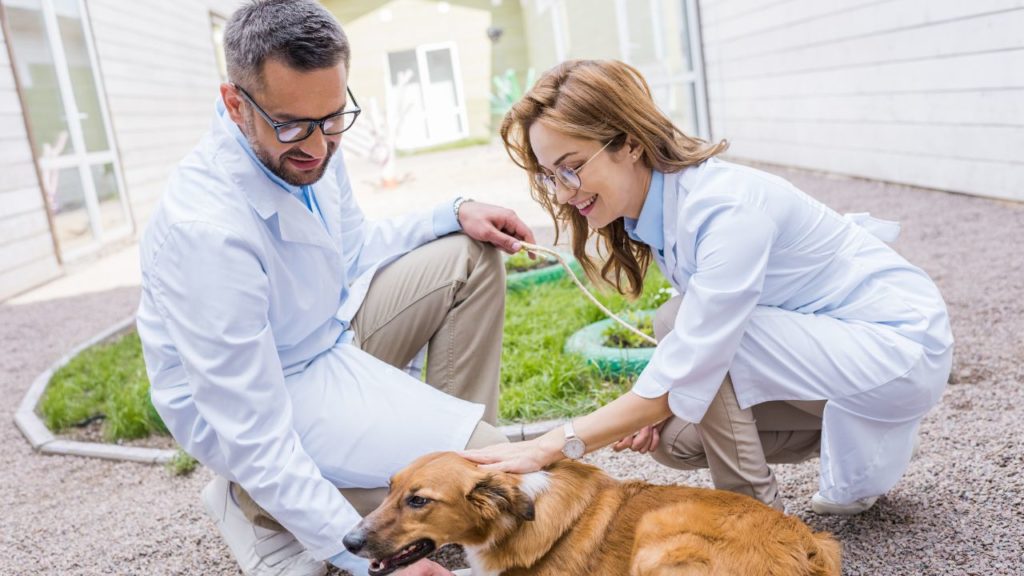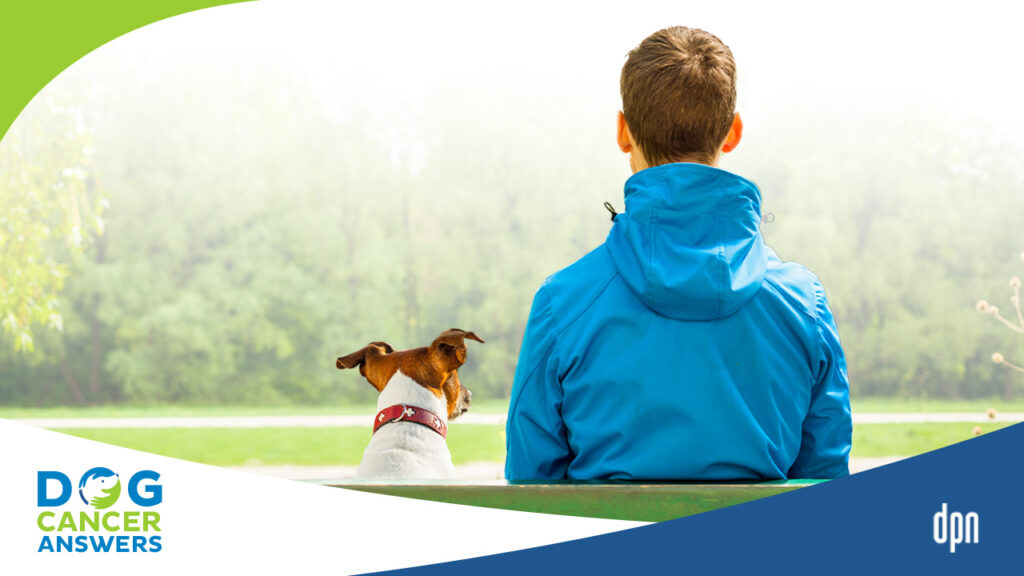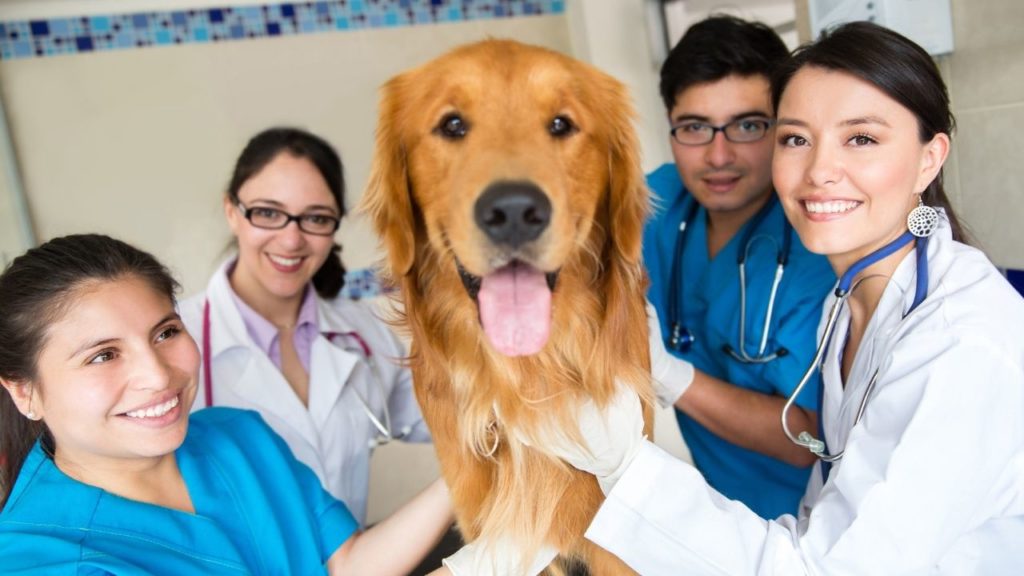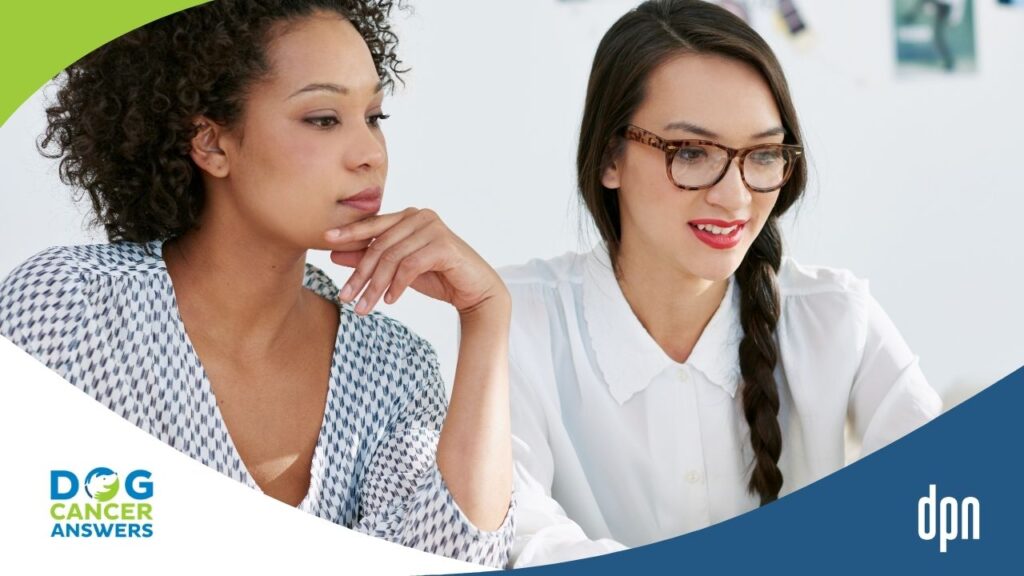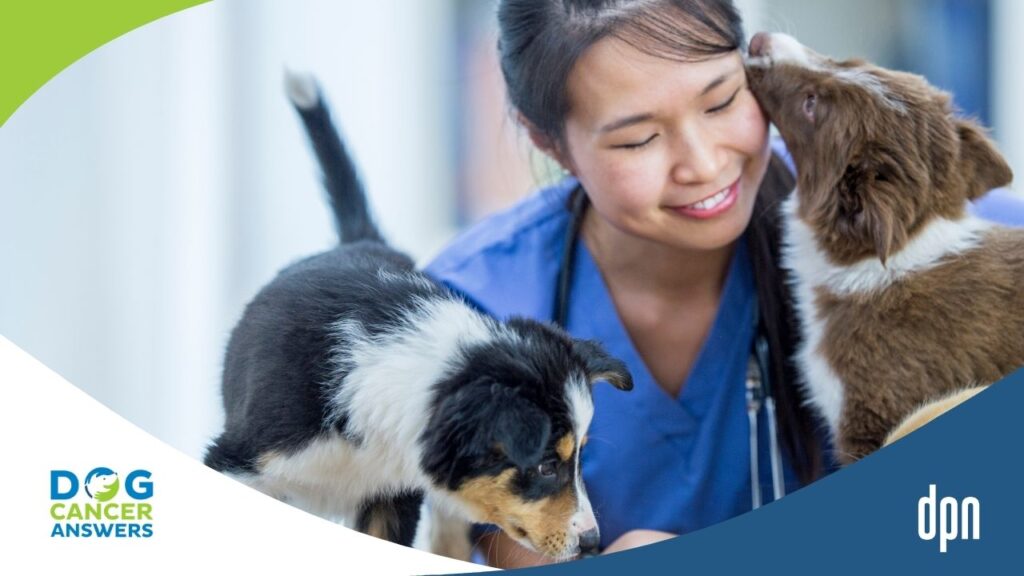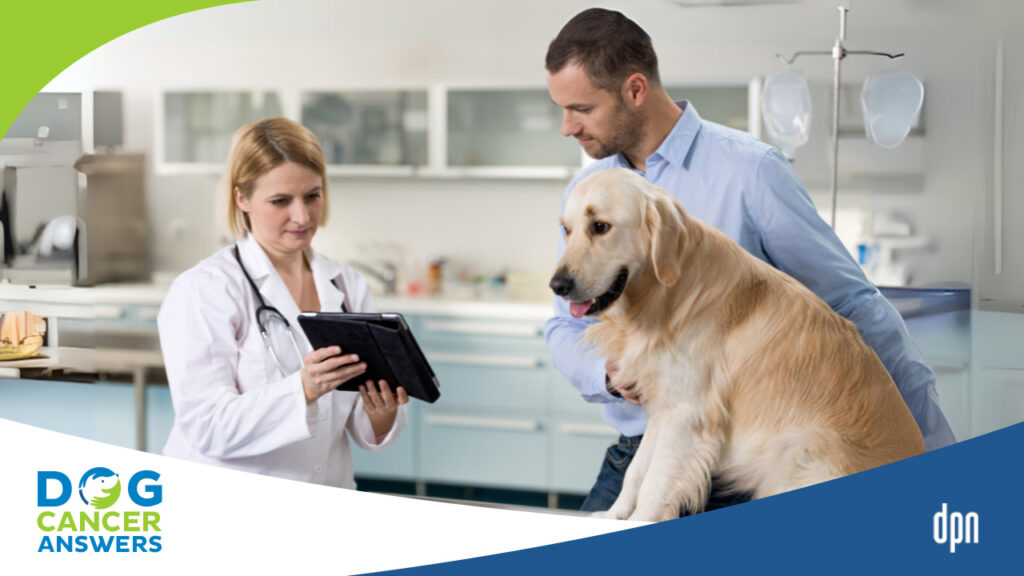EPISODE 160 | RELEASED March 28, 2022
Pet Cancer Care Consulting: Dog Cancer Care Online | Dr. Rachel Venable
Getting to an oncologist can be difficult. Now, you can consult with a veterinary oncologist online from the comfort of your regular vet’s office.
SHOW NOTES
While working in an oncology specialty center, Dr. Rachel Venable kept feeling like there were patients she couldn’t reach – or rather, that couldn’t get to her. So she decided to start her own business, doing oncology consults online.
Telemedicine laws can vary state to state, but most states allow teleconsulting. Your vet probably already uses one type of teleconsulting: sending x-rays out to a radiologist to review. The radiologist never examines the pet in person, but communicates with the veterinarian and works with them as a team. Dr. Venable uses this model for her consulting, but takes it one step further by doing a video call where she reviews the case with both the veterinarian and the owner.
[00:00:00] >> Dr. Rachel Venable: Just knowing there were so many people falling through the cracks because like what I said, the time and travel and, and all kinds of things, I just really felt like, you know, I could actually reach more people if I did teleconsulting than if I stay in a brick and mortar building.
[00:00:17] >> Announcer: Welcome to Dog Cancer Answers, where we help you help your dog with cancer. Here’s your host, James Jacobson.
[00:00:25] >> James Jacobson: Hello friend, getting an appointment with an oncologist can be challenging. We know that in the best of times, but since the pandemic it’s been even more complicated. However, today we have a solution that will appeal to those of you who have not spent a lot of time out.
You can actually talk with a live oncologist from the relative comfort of your veterinarian’s office. That’s right. You will be in a three way call, video call, with a vet and this oncologist, and of course your dog. To talk about this, we are joined by the founder of a new company called Pet Cancer Care Consulting. Her name is Dr. Rachel Venable. Dr. Venable, thank you so much for being with us today.
[00:01:12] >> Dr. Rachel Venable: Oh, thank you so much for having me.
[00:01:15] >> James Jacobson: So I am just so excited to talk to you because so many of our listeners say, you know, I really want an oncologist, but I live a gazillion miles away from an oncologist, or I don’t necessarily like the one that I saw, and there are so few of them, are there any that do, I don’t know, telemedicine? And, uh, we’re starting to see that. And you are one of those.
[00:01:39] >> Dr. Rachel Venable: Yes. Yeah. I think the, the pandemic kind of brought a lot of this out, you know. I think video conferencing and things, wasn’t something most people were familiar with or even open to before this.
[00:01:50] >> James Jacobson: Mm. So is this really sort of, it’s one of the benefits of the pandemic that made clients and other veterinarians more open to this telemedicine?
[00:01:59] >> Dr. Rachel Venable: I think so. I think, ’cause telemedicine it’s been around for quite a while, especially in people. But even really in people, it didn’t take off like it did until after the pandemic, you know, a lot of the rules and things were starting to get changed and people are actually thinking of it as an option.
I know myself personally, I, I never thought about telemedicine, you know, other than a radiologist reading x-rays remote, you know, I never thought about using it as a conversation.
[00:02:24] >> James Jacobson: So how have the rules changed that make this more possible these days from a rules perspective?
[00:02:31] >> Dr. Rachel Venable: Well, that’s a great question, you know, in the heat of the pandemic, you know, right when it was starting, a lot of states kind of didn’t really have many rules at all, they just sort of let people do telemedicine. And now they started reining that back in. So I think on the human side, I think it’s actually stayed a little more flexible than it was before, but in animals, it’s definitely, they’re definitely still figuring it out.
And a lot of states are still changing, kind of, how they do it. And I think, ’cause there’s this concern that if you just let telemedicine go wild, you know, could animals be harmed ’cause they’re just Googling, and are they really getting good information? So I think they’re still finding that balance and a lot of the states are, are still figuring that out.
I mean, of course you also have people that are just afraid of new things, you know, so they’re always kind of cautious when something new comes along. So I think it’s trying to find that happy middle ground.
[00:03:22] >> James Jacobson: So it is on a state by state basis, whether you can practice or receive telemedicine.
[00:03:30] >> Dr. Rachel Venable: The rules are definitely state by state and it’s actually kind of confusing. Most states it’s not very clear. Now with what I do with teleconsulting, most states you can actually do that. And it’s because I consult with the family vet. So it, it, I’m with the vet and the pet owner. So I’m not just going direct to the pet owner. That is trickier. And a lot of states are, are different rules on that.
But when you’re also consulting with the vet, that’s actually been around for quite a while because of things like x-rays, you know, and even pathologists. So the rules are pretty open as far as a vet to vet consultation. Um, and so what I’m doing is adding in the pet owner to part of that conversation and so that they can get educated.
And also, I think it, it’s hard on the vet for them to play, you know, phone tag, right? It’s like, okay, I talked to the specialist, they told me this, now I have to try to regurge all that to the pet owner. You know, I, I feel like that doesn’t put them in a fair situation.
[00:04:23] >> James Jacobson: So it sounds like there’s a distinction between teleconsulting and, and telemedicine.
[00:04:29] >> Dr. Rachel Venable: Yeah. So consulting, that’s, traditionally we think of between the vet and vet, versus telemedicine is kind of an overarching term for all different ways that you can use telemedicine. So teleconsulting’s included in that. Um, also if you talk with a pet owner just directly over like a video feed that’s telemedicine, or even you know, some ways people can use it is actually having video at the clinic, but the vet is actually offsite somewhere. That’s another way, like for text and things, even to talk to the vet. So that’s, that’s another form of telemedicine.
[00:05:01] >> James Jacobson: Is this like a whole new track in terms of, like at vet conferences now, are they talking about all the variations and permutations of integrating telemedicine, teleconsulting into veterinary medicine?
[00:05:13] >> Dr. Rachel Venable: It is. I, I think you definitely have that group that’s really pushing for it, you know? So they’re really talking a lot at conferences and… and I think too, it’s trying to help, ’cause I, I think in a lot of ways, well one, telemedicine, vets have been doing it forever ’cause technically phone calls and emails are telemedicine because you’re not physically talking with someone. So vets have been doing that forever.
So I think also finding ways of how can we be more efficient, you know, how can we better use of our time and, and then also the other thing that the groups are looking at is billing, right? ‘Cause we never bill for phone calls or emails. And so, you know, some of those big marketing software groups, they’re trying to figure out, you know, how do you keep track of all that.
[00:05:55] >> James Jacobson: I wanna delve into, in what you do and then we’ll get back into the meta, ’cause I think the meta is equally interesting to our listeners. But in terms of your practice, how does it work logistically? You you’re located where?
[00:06:09] >> Dr. Rachel Venable: I am actually in Arizona.
[00:06:10] >> James Jacobson: Okay. So you’re in Arizona and we have, I don’t know, a client in, let’s say Hawaii and they have a dog with cancer. How does it work?
[00:06:19] >> Dr. Rachel Venable: Yeah. So all they would need to do is they can actually find me on my website. So it, it’s PetCancerCareConsulting.com. So it’s kind of a mouthful, but it explains what it is.
[00:06:29] >> James Jacobson: And we will put the link in the show notes.
[00:06:31] >> Dr. Rachel Venable: Oh, awesome. Thank you so much. So, yeah, so they could go to the website and, you know, check it all out, but there’s different spots where you could message. So they could actually message directly so I get that, and essentially how it works, so I, a lot of times I’ll end up talking with pet owners as far as trying to coordinate things. So, from the pet owner, then we can go back to their vet and then I can talk to their vet and say, Hey, you know, your client reached out to me.
And how it works is I basically try to partner with the family vet to increase access to oncology. So like a vet clinic in Hawaii, I could call them, you know, an email and things, to explain to them how the services work. So to kind of explain it more – so like the consult, how that works is the pet owner would go back to their vet, sort of like a recheck exam and they would bring their pet.
And then over a video feed, so like a laptop or tablet, I’ve been on iPhone, you know, anything I’ve come across, so I talk with both the vet and the pet owners. So I usually start out with, you know, kind of summarizing, ’cause I would’ve already read through the record, so kind of just recapping, make sure I’ve got the right idea of what’s been going on.
I have the vet then do an exam on the pet to also make sure, you know, like the tumor’s not coming back or there aren’t big lymph nodes, you know, to kind of double check any concerning areas, and then I go into big detail about the cancer. So we talk about, you know, what it is, testing, treatment, prognosis, all those things.
And then I type up pretty big summaries that I give to the pet owner and to the vet clinic. So it, you know, it, it’s a way to, again, kind of have that three-way conversation to really get more information. And then also afterwards, if they’re interested, I can help guide therapy. So if the family vet’s comfortable, especially, you know, there’s so many pill options out there anymore, so you don’t have to have special equipment, you know, to do that.
[00:08:20] >> James Jacobson: Right.
[00:08:21] >> Dr. Rachel Venable: So I can help guide that. And then also for follow up questions, things like that. So let’s say something changes a couple months down the road, the vet has an account with me that they can do online. And so they can message me that way and update, send me records, you know, let me know what’s going on.
[00:08:37] >> James Jacobson: Okay. So is the main thing that a client is purchasing is that session with you and their vet where you’re there on, on an iPhone or an iPad or, or whatever, communicating. You’re basically having the veterinarian be the hands that you would do in terms of an examination. Is that right?
[00:08:56] >> Dr. Rachel Venable: Yeah. I think that’s a good summary. Yeah.
[00:08:58] >> James Jacobson: Okay.
[00:08:58] >> Dr. Rachel Venable: The vet’s kind of the, the hands for me there. And then for the client, it is, it’s getting more of that information – sometimes too, it’s even testing, you know, some, sometimes the vet’s not really sure what next steps, you know, what makes sense, ’cause they don’t wanna, you know, do tests they shouldn’t do or, or that kind of thing.
And then also, you know, things are changing all the time in oncology, especially the last couple years, we’ve had a lot of new stuff come out. So it’s, you know, as the family vet you can’t know everything about everything.
[00:09:26] >> James Jacobson: What kind of reception have you received from, from veterinarians, since this is driven by consumers finding you and then trying to enroll their vet, what kind of reception have you gotten?
[00:09:36] >> Dr. Rachel Venable: I think some vets are really excited, especially ones that live far from an oncologist. Those are, are really excited because they get so many clients that tell them no, you know, when they offer to see a specialist. And then, you know, some vets that are a little, they’re unsure, right, ’cause it’s a different thing.
You know, some people like trying to try something new that, you know, they’re already so busy. So there’s some that don’t, but I’d say overwhelming majority are pretty excited and we’re pretty flexible too. You know, I, I’ve had, some vets where they’re like, you know, we’re really simple, I don’t even have, like, my medical records are all paper. Um, so we’ve actually had some where the client bring their laptop in, you know, and as long as they can get online, I, I talk to them over their computer or their phone, you know, we’ve done that too. So definitely, you know, I try to make it as easy as possible and not put up unnecessary barriers.
[00:10:26] >> James Jacobson: So when do you usually come into this? Are you usually after there is a cancer diagnosis, after there’s been some sort of cytology done?
[00:10:35] >> Dr. Rachel Venable: Yes. Generally after there’s a diagnosis or – either by cytology or they’ve had a biopsy – or there’s some cancers where on imaging we strongly suspect, you know, that this is a, a certain type of tumor.
So that’s generally when I come in. If it’s still really unclear, like, is this infection or is it cancer, you know, I worry that I just wouldn’t give enough information for the client, ’cause normally it’s like, well we need a biopsy and then I can tell you everything. So when I do get scenarios like that, I’ll try to kind of help the vet, you know, as far as how to diagnose it, you know, to, before doing a full consult with me.
[00:11:12] >> James Jacobson: So how much work do you before that initial event where the vet and you are in the room with the pet owner and the dog?
[00:11:21] >> Dr. Rachel Venable: Well, sometimes it can be a lot of work. ‘Cause it can be, you know, talking to the vet clinic, helping them through just the process of setting up an account and that kind of thing. I read through the records, so making sure I get all the records, take notes on that and then, you know, there’s invoicing and that kind of back stuff that you have to do. But yeah, I think there’s, there’s a decent amount of work. The biggest thing really though, is making sure I get all the records and reading through everything.
So I always take notes ’cause a lot of these cases, it’s not a simple, like, oh, there’s just this one thing, like it’s been okay, so after these 10 visits, this is all the different stuff we’ve done and this is what we’ve come up with. So there can be a lot of going through records for sure.
[00:12:01] >> James Jacobson: Let’s talk a little bit about, you mentioned invoicing. Let’s talk a little bit about the dollars and cents of this. What are the prices?
[00:12:07] >> Dr. Rachel Venable: Well, typically, so a consult with me, and because it also it’s a consult and some of the telemedicine laws, so I actually bill the vet clinic and then the vet clinic then forwards that on to clients. So it, it depends somewhat on the clinic and you know, some of them they have like bought a laptop and things, so there’s gonna be some price variation or their typical re-check fee. But I’d say in generally it’s a few hundred dollars.
[00:12:31] >> James Jacobson: Okay, but I mean, you’re billing the veterinarian, the veterinarian’s remunerating you, do the vets tend to mark this up or is this just a pass through service or do you know?
[00:12:41] >> Dr. Rachel Venable: Um, I think it depends.
I think some may mark it up a little bit and I think it may depend too on just some of their, how much time and things they’re doing. Some of them it’s more of a, a pass through, but, you know, they’ll have like the re-check fee and that kind of thing. The other thing too, for vet clinics, you know, ’cause some of them, you know, they are a business, so they worry too about, well, is the oncologist gonna take all the business and, you know, something just to let them know it is, no, you know, because a lot of times I recommend all these tests and they actually do them there in-house. So it is something that I’ve found that a lot of these clinics can actually make money with this service because they’re doing things they wouldn’t have otherwise done before.
[00:13:20] >> James Jacobson: And so I guess in terms of like, thinking about that, we have really smart listeners and like, I think oftentimes want to understand how all of this kind of stuff comes together, that’s why we’re getting into a little bit of the nuts and bolts of it. So in terms of framing it up for a veterinarian who may be a little reluctant to this, they can think of this as an additional augmentative service or test they’re running on a dog or cat that has been diagnosed with cancer.
[00:13:45] >> Dr. Rachel Venable: Right. I, I think that’s a great way to look at it. And I, I think it’s another way too, for them to kind of stand out from the other clinics around, is that they can say, you know, we work directly with an oncologist. Like, you can actually, from the convenience of being here, ’cause you know, there’s a lot of clients, like you said, they either they live far away or some of them, they’re just not sure if they wanna see an oncologist, but they really have all these questions that their vets just can’t answer.
[00:14:10] >> James Jacobson: So how long is that appointment where the three of you, or and the four, including an animal, are in the room?
[00:14:17] >> Dr. Rachel Venable: Usually I would tell people to prep for about an hour.
[00:14:19] >> James Jacobson: Okay.
[00:14:19] >> Dr. Rachel Venable: The family vet doesn’t always stay in there that whole time. Sometimes when I start really talking about the disease, sometimes they’ll step out because they just have too many appointments. Sometimes it’s hard to get an hour of their time. But for the pet owner, I would plan on it, I would plan on being there for at least an hour.
[00:14:36] >> James Jacobson: Okay. And then usually just like, that’s the appointment, or do you have a bunch of follow up that you do either with the vet or with the client?
[00:14:45] >> Dr. Rachel Venable: So the follow up, a lot of it’s with the vet. So I have a, a portal basically from my website for vet clinics. So they have accounts, so they can basically message me so whenever they get a chance to get on the computer, they can message me, and I’ll, I’ll message them back. If clients wanna do another, like video consult, that’s an option as well. Usually I’d recommend waiting a few months, so that enough stuff has gone by to make it worth, you know, everyone’s time so we have something more to talk about. Uh, but that’s definitely an option too.
[00:15:14] >> James Jacobson: I wanna stop you right here. Let’s take a break. And when we come back a little bit more about how all of this works. You’re listening to Dog Cancer Answers.
So it’s sort of a, for lack of a better term, a B2B service that you’re providing to veterinarians, even though they may learn about it through their clients who find you. Is that how most vets come into your orbit, they have been told, "I found this oncologist," or is it that you are actively going out and getting vet clinics to offer your services?
[00:15:46] >> Dr. Rachel Venable: At this point, I’d say a little bit of both. So I’m definitely trying to educate the vet community, let them know that it’s an option that I’m out here, but I definitely find a lot of clients. The other thing that I’ve done too, that I’d like to do more of is partnering with actually the local oncologist. So here in Arizona, I have an oncologist that I’ve partnered with where her schedule is just too busy for her to get very many of these new consults in. But if people wanna do like IV treatment or chemo that their vet, you know, that’s not what they do, then we can actually get them in sooner to see this oncologist.
So actually, people calling that oncology clinic, that’s how a lot of people have found out about me, ’cause they’ll actually mention, they’ll say, Hey, we don’t have an appointment for a couple months, but you can try doing this with your family vet. And then if you want chemo, you know, we can try to get you in sooner.
[00:16:35] >> James Jacobson: Got it. So you’re sort of a, a backup to the incredibly busy oncologists that we have in North America because there are only a few hundred of y’all and uh, a lot of cancer. So, in terms of the treatment options, when you are working with a general practice veterinarian you are limited to, you know, pills, basically, tablets, metronomic chemotherapy, or, or things like that. Do you feel as a, as an oncologist who for many years, I presume have, you know, relied on chemotherapy and perhaps radiation, do you find that to be a limiting factor?
[00:17:10] >> Dr. Rachel Venable: You know, that’s a great question. One of the reasons I think it’s such a great question is because people always have the perception that if you’re gonna see the oncologist, you’re gonna do IV chemo. And I think even vets have that perception, I think they feel like, well, if these clients aren’t gonna do IV chemo, it’s not worth sending them to an oncologist. You know, I think sometimes people don’t get referred because of that. And what I found, even when I was in a brick and mortar building, is actually a lot of people don’t do IV chemo. You know, for various reasons, but I definitely, I, I don’t know the exact number, but I would say less than half of the clients that I would see would actually do IV. And, and sometimes it’s because IV is not the best option. But other times it’s because, you know, for various reasons they don’t want to, or they want more palliative care.
And I think that’s something to keep in mind, too, especially as vets and even as a pet owner, like there’s so much to be said about just getting knowledge and understanding what’s going on with your pet and what to expect. And if you decide to do palliative care, so like pain meds or antibiotics, that’s totally fine. I think – you don’t have to think, oh, I see an oncologist, I’m committing to, you know, this huge IV protocol and things. And working with the vets, it is a little bit different, you know, because when I was in the brick and mortar, you know, it was faster for me to get the IV chemo, ’cause it was right there , you know?
[00:18:25] >> James Jacobson: Yeah.
[00:18:25] >> Dr. Rachel Venable: Versus with these other clinics, it’s either coordinating to get them in somewhere else, or there are a few vets that will do IVs. So it, it is a little bit different dynamic, but honestly, what I tell the clients is the same. So as far as what I recommend, you know, I’m still, if the IVs the best, that’s still what I recommend first. And then it’s just trying to see what they wanna do and then logistically help them through that.
[00:18:48] >> James Jacobson: So this is a relatively new business. When did you start this?
[00:18:52] >> Dr. Rachel Venable: I actually started back in September. So yeah, it’s very new.
[00:18:55] >> James Jacobson: It’s very new. So can you share a couple of client stories with us? You know, like, uh, things that you feel would be instructive to our listeners?
[00:19:05] >> Dr. Rachel Venable: Yeah. You know, a few that I’ve had that I think that teleconsulting was certainly a good option for these people is, you know, there was one, um, this dog had a terrible rib tumor, so pretty painful. And the owners lived about three hours away from the nearest oncologist. So even getting in, you know, that’s a lot to put that dog through, you know, to drive that far. And so I think that was a, a nice one where they didn’t, you know, they could just go their local vet, which was like 10 minutes from them versus having to drive their dog so far. So, and we were able to do like some different pill options for her and try to make her more comfortable.
And then like a, another one I remember was a dog who was actually diagnosed with a lung tumor, and even had had surgery, but it had been about three months ’cause the owner just couldn’t get in anywhere and then they just kind of gave up. But when I saw them, the dog was actually still doing pretty good and we were able to help start some therapy, you know, with her family vet.
So it, yeah, I, I think there’s definitely times – and I’ve had a lot of clients who have just been really thankful, and I think because they just really like, either they couldn’t get in somewhere else and they were able to get in with me sooner or just not having to do that drive. You know, when I initially started this, I thought, well, maybe I’ll see a lot of younger people kind of millennials, you know, that like the technology and convenience factors. But what I’ve found is actually a lot of the clients are still older and I think they don’t necessarily like the technology.
Like it’s kind of funny, like sometimes I just see the top of their head a little bit, you know? ‘Cause they don’t have it all like set up correctly ’cause don’t really care about the computer. But they don’t wanna do the drive. I think that’s what a lot of the, the older clients, they’re like, if I can make it to my vet clinic I feel good, but I don’t wanna drive across town or drive hours, you know?
[00:20:49] >> James Jacobson: Okay. So in terms of the follow up, you said that you normally don’t do a follow up. It’s not normally part of what you’re doing currently, unless it happens a week or, or a month, whatever, later on in the process. I know that so many people are interested in like, you know, I got a question about this, I need support about this, I need support about that. What do you recommend to those types of clients?
[00:21:13] >> Dr. Rachel Venable: Oh yeah. I mean, even when I do that initial consult, if let’s say I recommend chest x-rays, I always tell the vet, you know, you can send those x-rays to me and there’s no additional fee for that, you know, like, so we can definitely get that followed that way.
And even clients, you know, I, I definitely have some that will email me, or usually what I’ll recommend is going through the vet, just because I don’t, you know, some of the telemedicine laws. But I think there’s definitely still ways to get more of that immediate follow up. Or if they have like, especially simple questions like, oh, Hey, in your consult, you said this and I don’t quite remember what you meant by that. You know, that, that simple stuff that I, I think I can definitely respond right back to, that’s no big deal. And then other things they could always ask their vet and then they can just message through that portal.
[00:21:59] >> James Jacobson: Okay. And then in terms of your own practice, do you address things like, like diet and supplements and all of that stuff, or do you mainly focus on the traditional oncology?
[00:22:09] >> Dr. Rachel Venable: I’d say I talk about everything.
[00:22:11] >> James Jacobson: Yeah.
[00:22:11] >> Dr. Rachel Venable: I certainly make sure I cover all the big, like what’s been studied kind of things, but I definitely will go into, especially diet, ’cause everyone has questions about diet, you know? So we go into a lot with diet. I also go into a lot of pain management or, you know, ’cause people, a lot of times also wanna know like, okay, what is this eventually gonna look like? You know? So we talk about that and, and supplements too, you know. Some of these we’ve got some good information on supplements. Some of them we don’t. But I definitely like to cover all of that.
[00:22:40] >> James Jacobson: Big meta question, we’ll put on your prognosticators hat for this. Where do you see this going?
[00:22:47] >> Dr. Rachel Venable: Well, I, I would like this to be more of a, a nationwide thing. You know, I, I actually had some other oncologists reach out to me and are interested in doing this. So it is something I hope to continue to expand this service over time so that we can reach more people, ’cause my whole thing is I know there’s so many people that fall through the cracks. You know, they wanna see the oncologist, but because of time, distance, or maybe even their own health, they, they just can’t. And so I I’m really hoping with this service that we can make oncology more accessible. And so my goal is to make this more of a, a nationwide and to have more oncologists so that we can do that.
[00:23:23] >> James Jacobson: So currently, how many veterinary practices have you worked with?
[00:23:28] >> Dr. Rachel Venable: I’ve got over 70 that have signed up with me. And consult wise, at this point, I think I’ve done, um, over 80.
[00:23:37] >> James Jacobson: Wow. Okay. And then right now, as you say, it’s just you, but you’re hoping to bring other oncologists on board and make this a long term national thing. So, I am interested in the genesis of this. I know you were at a big vet hospital chain for a while, and was it an entrepreneurial thing that got you, or what was the deciding factor that made you go, you know, I think there’s a space for this type of business?
[00:24:02] >> Dr. Rachel Venable: I don’t know if it was truly the entre- I feel like I’m a hesitant entrepreneur.
[00:24:06] >> James Jacobson: Reluctant, reluctant. Yeah.
[00:24:08] >> Dr. Rachel Venable: Right. Yes. So I, I think it was a combination of just being frustrated with the status quo, you know, I mean, there was, there was a long wait time to see me, which I didn’t like, but just it’s what it was. It was all I could do. And, and just with that, just knowing there were so many people falling through the cracks because like what I said, the, the time and travel and, and all kinds of things. And then just with the pandemic and really seeing more of the, the video conferencing and the other options, I just really felt like, you know, I think there’s a niche for this. And I think I could actually reach more people if I did teleconsulting than if I stay in a brick and mortar building.
[00:24:46] >> James Jacobson: And what is the competitive landscape? How many other people are, are doing this?
[00:24:51] >> Dr. Rachel Venable: Not very many. There’s really only one other gal that I can think of that’s doing a very similar thing, but not exact. There’s other consulting groups, but they’ll just talk to the vet.
So like the big labs, like IDEXX and Antech, they only talk to the vet. They don’t talk to pet owners at all. So there, there’s not really very many talking to pet owners. I think for me at this point, it’s more getting the word out that this is an option, and getting vets to see that this is a good option, you know, a way to help benefit them and their practice.
[00:25:25] >> James Jacobson: Our podcast reaches people, not just in the United States, but around the world. Is this something that you would do with clients outside the US?
[00:25:32] >> Dr. Rachel Venable: I would totally do it. And I think, you know, a lot of these, I always have to, even in the different states, I kind of have to look through the laws and I, and I have an attorney to kind of make sure like, okay, this is all legitimate. And so like, Canada is one of the markets I’ve actually been looking at, ’cause I’ve had some people reach out. But from what I’m seeing so far, I, I think it is something I should be able to do and definitely interested in doing.
[00:25:55] >> James Jacobson: Let’s go back, ’cause you touched on this at the top of the interview, you were talking about each state has its own laws as it relates to it. Is it more related to what the local vet can offer in terms of telemedicine or what you as a resident of Arizona can offer?
[00:26:12] >> Dr. Rachel Venable: It’s more me, and it, it’s because something, it’s called a client patient relationship. It’s like one of those phrases that I don’t think people really talked about much before telemedicine. Like I remember learning about it in vet school, but-
[00:26:24] >> James Jacobson: Yeah.
[00:26:25] >> Dr. Rachel Venable: And so it, it’s trying to navigate that, because you really need to have that relationship to be able to prescribe medication, you know, to really go in depth talking to owners. And so I’m not prescribing at all, but I am talking in depth to people about their specific pet. And so that’s where, you know, just trying to figure out, again ’cause I’m consulting, that’s generally okay in most states, but you know, it is kind of funny, especially in veterinary medicine, there’s different rules in every state.
It, it’s all, it’s all a little bit unique. And I actually did a, a speaking, conference down in Puerto Rico this fall, and even trying to figure out some of their laws, and one of my good friends is a vet down there. And so I asked her before I came down, I was like, well, you know, can I even do consulting, you know, how’s it look. And she sent me back these documents and she was like, oh yeah, look, it’s right here. And it was all in Spanish and I’m like, uh, okay, well, I have a hard enough time reading legal documents in English but uh, okay.
[00:27:24] >> James Jacobson: Have the big trade association, the American Veterinary Medical Association, weighed in on this?
[00:27:30] >> Dr. Rachel Venable: So they actually, and they were even one of them that kind of got me thinking about it. So they put out a big telemedicine guideline, I wanna say it was like last, maybe early spring, like Marchish, April, somewhere in there, and they had commented on the specialist talking with the vet and the pet owner, you know, when they otherwise couldn’t get in to a specialist. So they were actually the ones that kind of got me thinking about it. But they did say, kind of their comments along that are, and you still have to check state to state to make sure that that’s all okay.
[00:28:01] >> James Jacobson: Got it. So you’re pretty excited about this, you’re fully vested in this venture and you’re actively looking for more clients, people who have pets with cancer. Again, how can people reach out to you to learn more about your services?
[00:28:16] >> Dr. Rachel Venable: My website’s probably the best. Um, it’s pretty detailed about what I do and easy ways to message with any questions. And then of course, you know, I’m on Facebook and Instagram and LinkedIn too.
[00:28:29] >> James Jacobson: Can folks get an initial consultation for free or for a low price to find out if this is a good fit?
[00:28:35] >> Dr. Rachel Venable: I haven’t done that yet.
[00:28:36] >> James Jacobson: Okay.
[00:28:37] >> Dr. Rachel Venable: So, I hadn’t thought of that.
[00:28:39] >> James Jacobson: Okay. Well, there you go.
[00:28:40] >> Dr. Rachel Venable: So now, now I’ll have to think about that.
[00:28:42] >> James Jacobson: Sorry.
[00:28:43] >> Dr. Rachel Venable: But yeah, I, I think too, like, you know, a lot of times talking with the vet and, and a lot of times I do end up talking with owners, especially when we’re trying to navigate setting this up-
[00:28:51] >> James Jacobson: Yeah.
[00:28:51] >> Dr. Rachel Venable: -and there’s been times where people tell me things that I’m like, uh, you might wanna see surgery first.
[00:28:56] >> James Jacobson: Right.
[00:28:56] >> Dr. Rachel Venable: You know, or so I guess I do end up giving a little bit of free advice that way.
[00:28:59] >> James Jacobson: Awesome.
Well, Dr. Rachel Venable, thank you so much for being with us. I think this is a pretty awesome service and something that is long, long overdue. Thank you.
[00:29:09] >> Dr. Rachel Venable: Yeah. Thank you so much. It was awesome being on this with you guys.
[00:29:14] >> James Jacobson: And I want to thank you for joining us for Dog Cancer Answers today. I think this whole concept of telemedicine or teleconsulting is going to get bigger and bigger. And I think this space is really right for it because if you have a dog with cancer, you want as many voices, as many experts to weigh in as possible. And, uh, to be able to do it at your vet’s office is pretty cool.
We have show notes for this episode, which you can find in your podcast app or on our website at DogCancerAnswers.com, including links to Dr. Venable’s business. If you have a dog with cancer, I hope you will join our private community where you can talk with other dog lovers around the world using our Facebook group. And you can find that by going to DogCancerSupport.com, check it out. It is a compassionate community for dog lovers who are dealing with all types of cancer. And, uh, you may find some of the answers you need from people who are going through it, just like you. DogCancerSupport.com.
That is it for today’s episode. I’m James Jacobson, on behalf of all of us here at Dog Podcast Network, I wanna wish you and your dog a very warm, Aloha.
[00:30:35] >> Announcer: Thank you for listening to Dog Cancer Answers. If you’d like to connect, please visit our website at DogCancerAnswers.com or call our Listener Line at (808) 868-3200. And here’s a friendly reminder that you probably already know: this podcast is provided for informational and educational purposes only.
It’s not meant to take the place of the advice you receive from your dog’s veterinarian. Only veterinarians who examine your dog can give you veterinary advice or diagnose your dog’s medical condition. Your reliance on the information you hear on this podcast is solely at your own risk. If your dog has a specific health problem, contact your veterinarian.
Also, please keep in mind that veterinary information can change rapidly, therefore, some information may be out of date. Dog Cancer Answers is a presentation of Maui Media, in association with Dog Podcast Network.
Hosted By
SUBSCRIBE ON YOUR FAVORITE PLATFORM
Topics
Editor's Picks
CATEGORY


